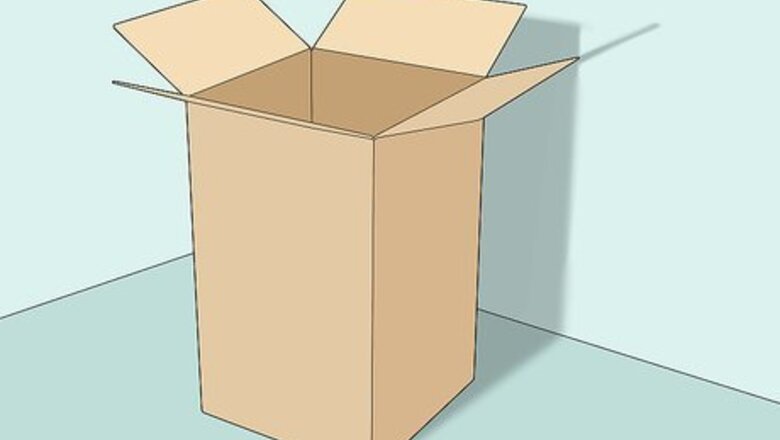
views
Making a Tin Man Costume from Cardboard and Common Supplies
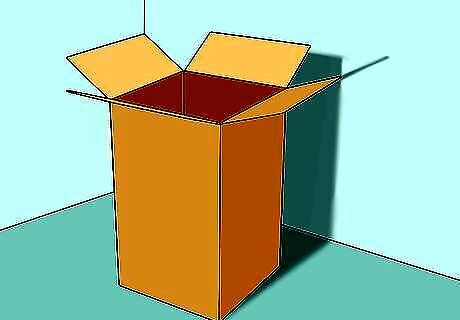
Start with a large cardboard box. You should cut it so that it can open flat. You will want a box that can fit your frame, so it should be large enough to cover your torso from the top of your shoulders to hip level. Cut the box open with a box cutter, and remove the top and bottom panels. Cut down one of the side creases so that the cardboard opens flat in one large piece. Be careful when cutting the box as this tool can be very sharp. Don't worry if the edges are jagged. You will tape these later to make them smooth.
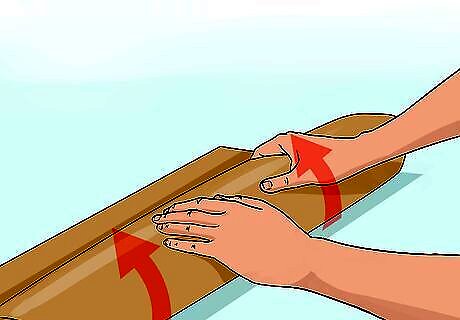
Make the box into a circular shape. You will need to roll up the cardboard tightly to make it more flexible. Remember, the torso part of the Tin Man's costume was rounded so you won't want the box to have its creases that make it square. Start at one end of the cardboard piece and start rolling it up tightly. Go slowly, making sure that the edges of the box are straight as you roll it.

Fit the box to your body. You will want the box to fit comfortably around your torso with some room for movement. To fit the box, hold your arms down at your sides. Have a friend or helper wrap the box around your body. Make sure the top of the box is level with the top of your shoulders. Tape the box into place. There will be an area where there are flaps from the box that overlap. Don't worry about this as it will be covered in tape. Use packing tape or duct tape to tape over the vertical edge where the sides of the boxes overlap. This will now look like a large cardboard tube.

Make the top part of the barrel shaped torso portion of the costume. This is the part that will sit over the shoulders and have a hole for your head to go through. Start this section by setting the large cardboard tube you just constructed over a large sheet of plain cardboard. Trace the circumference of the tube onto the sheet of cardboard. Use a box cutter to cut out this circle of cardboard. Next, measure the circumference of your head and add 1-2 inches. Cut out a circle out of the center of the cardboard circle to match this measurement. Try sliding the cardboard circle over your head. If the head hole is too small, you can trim a little extra off of the inner cardboard circle to make it bigger. Once fitted, tape this circle over the top of one end of the tube. Use duct tape all the way around to ensure a good seal and to secure the costume. Tape it on the inside and outside of the tube to insure that it will stay in place.
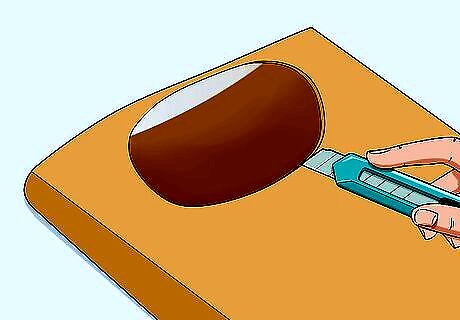
Make the arm holes. You will need to slide the tube over your head to see where your arms fall to determine the location of these. Put your arms at your sides and have a friend or helper slide the box tube over your head. Mark the position where your arms start from your shoulder on the tube. Take the tube off and cut holes large enough for your arms to fit through and move comfortably. You may have to adjust the size of these several times before you get them big enough. Make sure you can get your arms in and out of the costume through these holes comfortably. Cover the edges of the arm holes with duct tape to smooth them out. The structure of your torso portion of the Tin Man costume is now constructed!
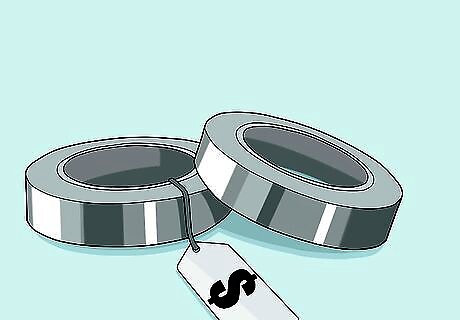
Purchase some aluminum ducts. These are corrugated metal tubes that you will use to make the arms of your costume. You can find these at your local home improvement store. They come in several sizes. If you are making a child's costume, you will need a smaller size. Try sliding the tubing over your arms at the store to see which size is the best fit for your body.

Trim the aluminum ducts to fit your arm length. This will require help from a friend since the tubing is stiff and hard to maneuver in. Slide the aluminum duct tubing over your arm to size it. Measure out where your fingers are and have your helper mark the tubing at this point with a pen. Use a razor blade to cut the tubing at your mark, all the way around. Cover the end of your arm tubing with duct tape to prevent cuts and splinters. For the shoulder portion, bend the top of your trimmed arm piece to conform to the curve of your upper arm and shoulder. Cover this top part in duct tape to hold this in place.
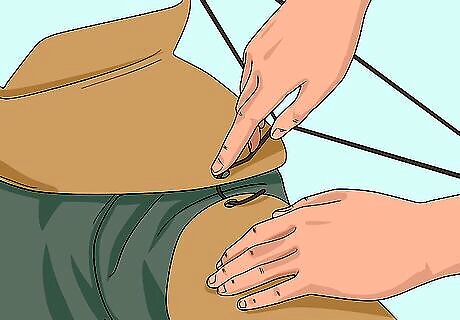
Attach the arms to the torso piece. You will need a wire hanger for this step. Put the cardboard torso piece onto your body, and slide your arms through the arm holes. Put on the arm pieces you just made, sliding the tops of the arm pieces through the arm holes on the torso part slightly. Have your helper make two holes in the top of each arm piece and two corresponding holes in the top of each side of the top of the torso piece just above the shoulders on each side. Thread an unbent wire hanger through these holes and attach the arm pieces to the cardboard torso. You should have a good deal of maneuverability at the shoulders of this costume.
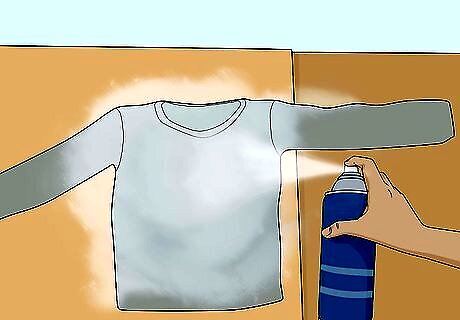
Get the underclothes of the costume. You will need a long sleeved shirt, an old pair of jeans, an old pair of sneakers, and a pair of gloves. Spread these out on a cardboard surface. Use metallic spray paint to paint these a shiny silver color. Rustoleum brand is recommended by costumers since it is a high quality spray paint. The pants may be the most challenging part of this step as they don't take paint as well as other fabrics. You may need two coats of paint. If the fabric from the clothing is showing through or the color isn't as shiny as you want, do a second coat after the first coat dries.

Paint the torso and arms of the costume. You can do this with the same type silver spray paint as you used for the clothing. Even though the aluminum tubing you used to make the arms is already silver, you will want to paint this as well to cover up any areas that are duct taped. You will want the arms to be the same shade of silver as the rest of the costume, too. Apply a generous coat to the cardboard torso, and then let these parts dry. After the arms and torso of the costume are fully dry, you will want to apply a second coat to ensure the color is even throughout.
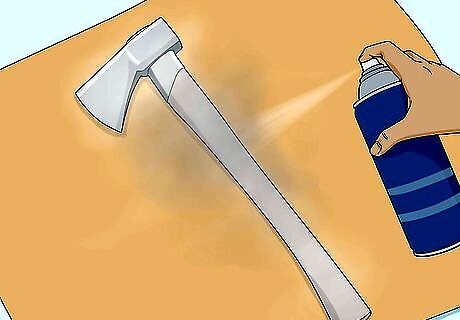
Paint the costume accessories. These will be the axe and hat part of the costume. Lay the funnel you bought on a cardboard surface and paint it generously with metallic spray paint. Do the same for the axe of the costume. Apply a second coat of paint if needed.
Sewing A Tin Man Costume for a Child
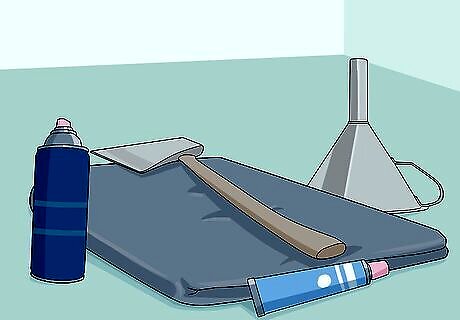
Get your supplies together. You will need the following: Vinyl fabric (in silver if available). 1/4 inch PEX Pipe Tubing 1/4 inch threaded rods Silver Metallic Spraypaint (Rustoleum brand works the best) Aluminum vent tubing (try it on your subject to see what size will fit the arms) Large bolts (to use as buttons for the front of the costume) Sweat pants or leggings (these will be painted so be sure they aren't ones you will miss) 1 inch wide heavy duty velcro for the back of the barrel part of the costume 1/2 inch wide velcro for the front of the costume 3/8 inch grosgrain ribbon Epoxy glue for attaching the bowtie and buttons down the front of the costume A pair of cotton gloves A funnel and prop axe. A small watering can
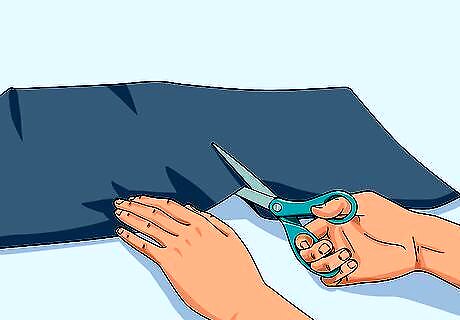
Make the top of the barrel section of the costume. This will require you to measure the shoulders of your subject from the edge of one shoulder to the edge of the other. Cut a circle from your vinyl fabric that has the diameter of your shoulder measurement, adding an extra 1/4 inch for seam allowance. Cut a circle out of the center of this piece that is the same width as your subject's neck, plus a little extra room for comfort. Cut in a straight line from the center circle to the edge of the outer circle. This will allow your subject to get their neck into the costume.

Make and attach two collar pieces from vinyl fabric. These will be crescent moon shaped. Measure how high your subject's neck is to see how high you want the collar to go. Use this measurement to determine how wide the crescent shaped vinyl pieces should be. Cut out two identical half moon shaped pieces out of vinyl. Place one of these collar pieces face down (shiny side down) on the cut circle piece from the last step. Line up the front tip of the crescent with the front part of the inner circle. The front tip of the crescent should be directly opposite the cut straight line that will allow you to put the costume on your subject's neck. Sew the collar piece to the circle piece along the inner circle. Leave a 1/4 inch seam. Repeat the process for the other collar piece, sewing it on the other side of the circle. Trim any excess fabric from the back of the collar.
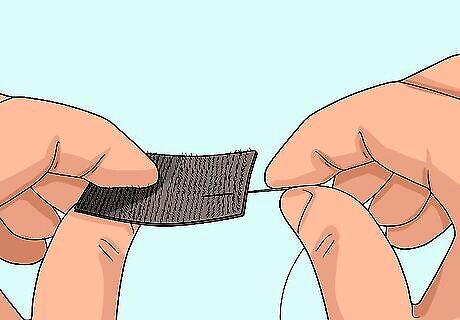
Make velcro clasps. These will be used to close the neck and shoulder piece of the costume after it is put on. Cut out two small rectangles of vinyl fabric. Sew one end of one of the rectangles to the left side of the collar on the back of the costume. Attach a small piece of velcro to one end of the rectangle. Attach the other side of the velcro to the right collar piece. This should now form a flap that you can velcro together to hold the costume closed. Repeat this process, but this time attach the flap and velcro to the circular shoulder piece across the cut you will use to get the costume onto your subject.
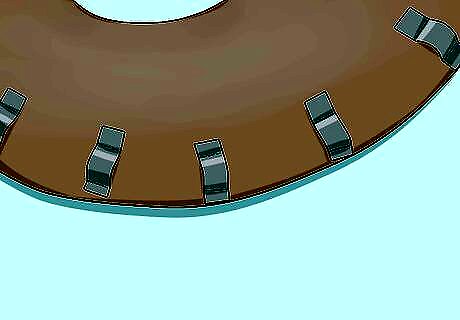
Sew 1 inch pieces of ribbon along the underside of the circle shoulder piece. Do this along the larger outside edge. These will be use to hold in the tubing. Space the pieces of ribbon out every 2 inches. Stitch them along the edge, the leave a gap and sew the other end of each ribbon piece. These will look like small loops on the underside of the shoulder piece. Make sure you sew the ribbon on 1/4 inch from the edge of the shoulder piece.
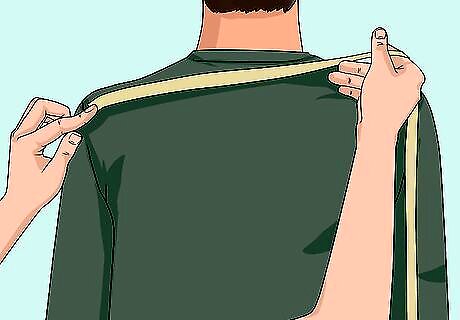
Measure your subject for the barrel shaped part of the costume. This will go over the torso. To do this, place the circular shoulder piece (that you just sewed the collar and ribbons onto) and place it on your subject. Measure from the edge of the circular shoulder piece down the front of your subject to where you want the torso part of the costume to end. Add 1/4 inch to this measurement. This will be how long your piece of vinyl fabric will need to be. Measure the circumference of the circular shoulder piece then add a few inches to this measurement for overlap; this is how wide your next piece of vinyl fabric will be. Cut out your vinyl fabric for the torso part of the costume according to these measurements.

Attach the piece of fabric to the torso to the shoulder piece. Start by lining up the right side of the shoulder piece (at the cut out gap you use to get the costume on). Sew the top edge of the large rectangular torso piece along the outer edge of the shoulder piece, leaving a 1/4 inch seam. Make sure you are sewing on the underside of shoulder piece and the backside of the torso fabric. Leave a tail of excess fabric from the rectangle torso piece once you have completed sewing around the circle. This is where you will attach velcro to hold the costume closed.
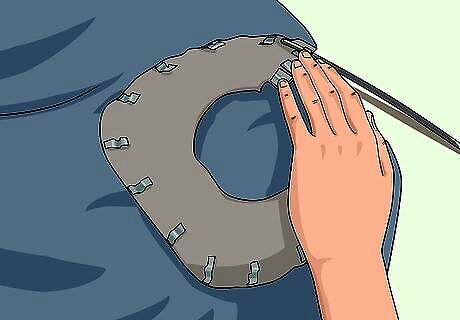
Slide your tubing through the ribbon loops on the underside of the shoulder part of the costume. Start at the first loop by the gap in the back of the costume, threading the tubing through each loop as you go around the circle. Trim the tubing down to size so the costume can close in the back without a large gap. Trim down a piece of threaded rod by about 2 inches. Stick this in one end of your tubing, leaving some hanging out the end. Secure it with glue. Stick the other end of the rod into the tubing on the other side of the gap on the shoulder piece to close the tubing so it looks like one solid piece. This serves to hold the costume closed as well as to support the circular shoulder piece of the costume. Remove the tubing from the ribbon loops.
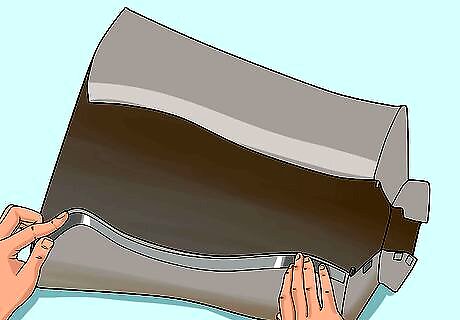
Attach a long strip of 1 inch velcro along the excess edge of the torso piece. This will be in the back of the costume. Make sure the velcro extends the entire length of the torso piece from top to bottom. Attach the opposite side of the velcro strip on the opposite flap of the back of the costume. You can now thread the tubing back through the ribbon loops.
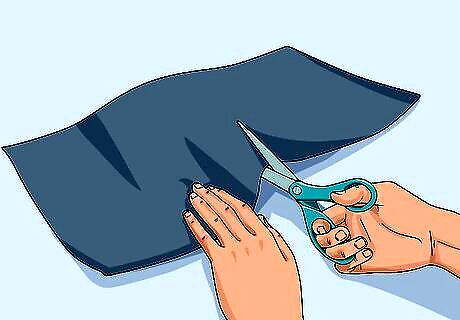
Make the bowtie of the costume. Start this part by cutting out a small rectangle out of your vinyl fabric. Make this rectangle as wide as you want the bowtie to be. Cut a smaller strip of vinyl out as well to tie the center of the bowtie. Pinch your rectangle of vinyl in the center. Wrap the smaller strip of vinyl around this to tie it. Secure the center of the bowtie with epoxy glue. Attach the bowtie to the collar on the front of the costume with epoxy glue.

Make the arms of the costume. Start by cutting out arm holes in the side of the torso part of the costume. Make the arm holes slightly larger than the size of the arms of your subject so he or she can move freely. Measure the length of your subjects arms and their circumference. Add a couple of inches to the circumference measurement as you will want the sleeves of the costume to be slightly loose. Cut a rectangle of vinyl fabric as long as the arm measurement and as wide as your circumference measurement (plus a few inches for movement room). Sew the rectangle into a tube, using a 1/4 inch seam. Cut your aluminum duct tubing. You will want two small pieces per arm: one for the shoulder area and one for the elbow. Pinch the duct tubing for the elbow piece on one side and secure it with thread. Slide the shoulder piece of duct tubing over the vinyl tube you just sewed. Sew this on with a strong needle and thread in several places. This will form the top part of the sleeve. Slide on the elbow piece of duct tubing over the vinyl tube and secure it on with thread. Attach the shoulder duct of the sleeve to the armhole on the torso piece of the costume with thread. It is okay if there are a few gaps as this is just to hold the costume together. Repeat this process for the other sleeve of the costume.
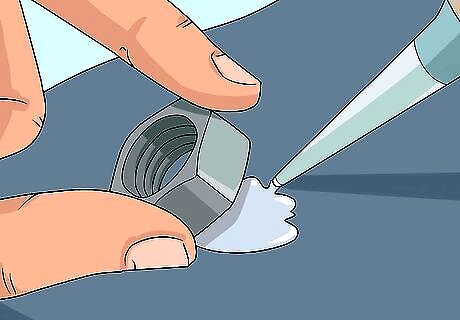
Add the buttons to the front of the costume. You will attach these using epoxy glue. Remember, the deadbolts are going to serve as buttons. Space these out evenly just off center, running down the front of the costume. Glue them onto the torso piece with epoxy glue. Allow these to dry completely before doing anything else with this part of the costume.
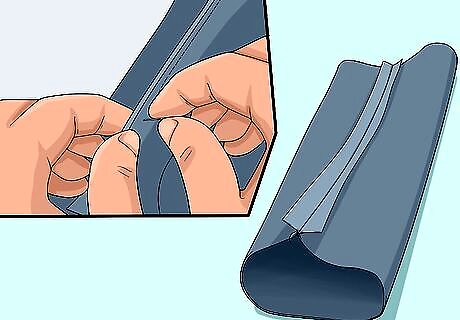
Make the pants of the costume. This is a relatively simple process: Measure how long the pants or leggings are you are using as a base from crotch to ankle and the circumference, adding 1/4 inch to each of these measurements. Cut out two rectangles of vinyl fabric. Each should be as long as the pant length measurement and as wide as the circumference measurement of the under-leggings. Sew these rectangles into tubes, leaving a 1/4 inch seam. Secure the tubes on to the leggings, sewing all the way around the top and bottom using 1/4 inch seams. Make the knee portion out of aluminum duct tubing. Cut a short piece big enough to cover the knees of your subject. Cut the tubing open at the back so you can fit it over the legs of the costume. Hot glue this to the knee area of the pants of the costume.
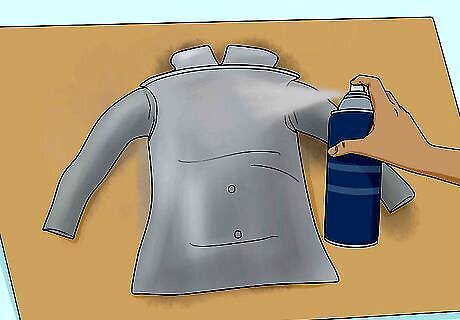
Paint the costume. You will need to use several coats of Rustoleum metallic silver spray paint. Paint the torso/shoulder portion and the pants. You should also paint the costume accessories at this time, including the gloves. The funnel will serve as the tin man's hat, and the watering can will be the oil can. If you have an axe prop, paint it as well. Allow the costume to dry completely before allowing a child to wear it.















Comments
0 comment